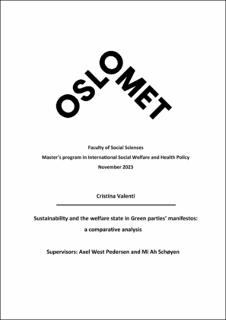Sustainability and the welfare state in Green parties’ manifestos: a comparative analysis
Master thesis
Published version
Permanent lenke
https://hdl.handle.net/11250/3119601Utgivelsesdato
2023Metadata
Vis full innførselSamlinger
Sammendrag
Climate change and the environmental crisis required the international communities to take action to reduce greenhouse gas emissions and move towards a low-carbon society. Nonetheless, carbon mitigation policies have regressive effects, raising questions about fairness and distribution of burdens within and among countries.
Green parties are historically committed to ecological sustainability and social justice, making it interesting to explore how they would proceed to implement the transition to a sustainable society that respects planetary boundaries and protects the most vulnerable segments of the population. Using qualitative content analysis, I examine the Norwegian, Italian, German and French Green parties to explore what social policies are outlined in their party manifesto if they mirror the national welfare state in which they are embedded, and how they would implement the transition. Despite their commitment to ecological sustainability, they do not propose drastic measures but are aligned with other political actors, and ideological commonalities prevail over welfare state regimes theory.
